Liz Weir
UMBC Faculty-Led: Summer Creative Writing in Wales
Major: Psychology
Minor: Writing
May 31, 2024 | Study Abroad Ambassador Post – Pre-Departure
How do you come to terms with the feeling that you don’t belong? Everyone experiences this
emotion at some point or another, and everyone has their own way of dealing with it. Maybe you seek
out friends who will accept you for who you are. Maybe you set out with your stick and bindle to
search for that place where you will feel at home. Or maybe, if you have an extremely backwards,
upside-down way of going about things, you’ll throw yourself headfirst from the plane and go
parachuting into places where you most certainly know you don’t belong. I like this method. I don’t
want to shy away from that feeling of being far from home. Through studying abroad, I try to explore
every part of that feeling, and what may happen in the process is that I find my experiences have
altered my definition of the word “home” itself.
I don’t pretend to be someone who does not carry with them the weight of many learned
stereotypes and preconceptions. What I do know, and what drummed a marching beat in my mind as
I wrote up my application for this trip, is that it is my civic duty to learn not just the depth of truth that is obfuscated by shallow stereotype, but also to walk the paths of my mind that lead me there in the first place. As I follow the path, I trace the ruts of the wheelbarrow that deepen with every day I continue to carry these assumptions. Where do these ideas come from, and to what do they lead? I find that at the end of one of these paths, of which there are countless branches, lies the Wales of my
imagination, a place that wavers on the horizon as a mirage of clouds and grass. To make way for
truth, to fill the ruts and potholes in the road and give this vision of a place body in wood and stone, I
must come prepared to combat the mistruths that fester in the foundations. Herein I will attempt to
define this place, before my eyes and ears and all senses experience it, as it lives in my mind, the
Wales of my imagination…
Today in Maryland, the sky is cloudy. Shy glimpses of sun peek between sprinkles of rain, and the maple and pear trees shiver in their new green coats against the nervous wind that can’t seem to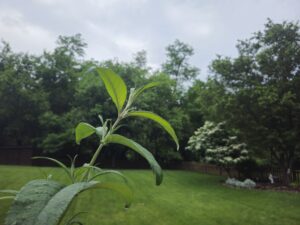 choose one direction or the other. Excitement brews among the flowers for a humid tomorrow, while the neighborhood is napping and grumbling and closing up the grill for a forecast that only assumes the worst. Wet but not muddy, and not cold so much as chilly. A day for eating soup and crackers and watching your dog sleep. In the Wales of my imagination, the weather is much the same. I grasp at memories of movies to sharpen the details, and from the fog emerges pictures of small towns and telephone booths. Cobblestone covers the ground and castles scrape the sky. I feel sheep’s wool, I hear the pitter-patter of rain. Beyond this… nothing.
choose one direction or the other. Excitement brews among the flowers for a humid tomorrow, while the neighborhood is napping and grumbling and closing up the grill for a forecast that only assumes the worst. Wet but not muddy, and not cold so much as chilly. A day for eating soup and crackers and watching your dog sleep. In the Wales of my imagination, the weather is much the same. I grasp at memories of movies to sharpen the details, and from the fog emerges pictures of small towns and telephone booths. Cobblestone covers the ground and castles scrape the sky. I feel sheep’s wool, I hear the pitter-patter of rain. Beyond this… nothing.
I don’t know much about Wales, nor Dylan Thomas, whose name adorns the university we are
bound to visit and inhabit for 13 days and nights. Is this something to be proud of? To be free of
misconceptions only on account of ignorance? Can I say that I come to this place with an open mind,
when all I really feel is nakedly unprepared? Before I embark on this trip, I must decide how I will go
about the question: Who are the Welsh people, what do they feel and dream and want to accomplish?
To answer it, I may study what feelings and dreams and accomplishments that they have put with pen
to paper: namely in the works of Dylan Thomas, but also through the voices of all the authors and
poets we will meet and hear from on this trip.
As I zip up my suitcase and carry it to the door, I notice that it feels much lighter than on my
last study abroad trip. Is this what an open mind feels like? Last year, my returning bags were
overflowing (a tenth of an ounce below the airline limit) with memories. This time around, I don’t want
the things I take away to be solely material. I want to bring home a mindset changed by the forging of
new paths, a way to conceptualize belonging in and to a place, and of what that home means to me.
6.14 Study abroad ambassador in-country post #1
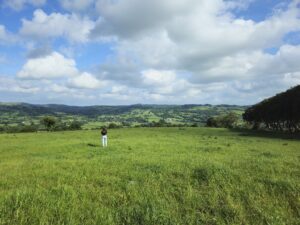 Our 7-hour plane ride to London, England is followed by a 5-hour bus ride to Lampeter, Wales. The bus jumps and buggies down the narrow road lined with stone walls and hedges that rise and fall with the curvature of the earth. Trying my best to ignore looming carsickness, I fall in and out of sleep watching the well-kept lawns bloom into wild grasses and sweet cherry trees. Crowded rows of city apartments gradually dissolve into clusters of cottages and sunken townhouses colored blue beige and egg-white.
Our 7-hour plane ride to London, England is followed by a 5-hour bus ride to Lampeter, Wales. The bus jumps and buggies down the narrow road lined with stone walls and hedges that rise and fall with the curvature of the earth. Trying my best to ignore looming carsickness, I fall in and out of sleep watching the well-kept lawns bloom into wild grasses and sweet cherry trees. Crowded rows of city apartments gradually dissolve into clusters of cottages and sunken townhouses colored blue beige and egg-white.
You probably would not guess, from the vast rolling hills and fields, that Wales as a country is only the size of New Jersey. Wales is home to 3 times as many sheep than people. There are about as many sheep in Wales as there are inhabitants of New Jersey (10 million). How many people live in Wales? Thankfully, I am not here to study math! 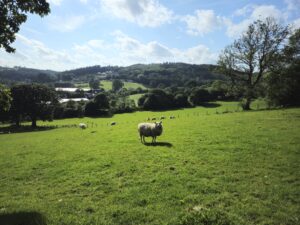
At the university where we’re staying, I have a single room with a bath and a desk. Through the window, I can hear the distant bleating of sheep and the trickle of rain. As part of this creative writing program, every morning we have a workshop at some place of history and Welsh lo4e like a castle, memorial site, or old church and Welsh lore, and every evening we attend a reading by a local Welsh author or poet. These accomplished artists sharing their life collections of dreams and memories with all of us curious, young students have gotten me to think about language as a formative device: not just a skill you learn, but a process that is practiced and molded into the way you think, feel, and navigate the world around you. The Welsh language is a very special one. It was banned in the UK for centuries, but kept alive by dedicated communities who continued to pass down the tradition by generations of families practicing it at home.
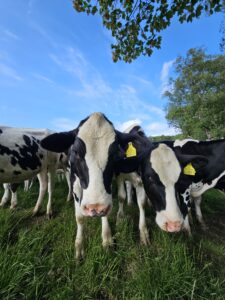 The way each of us thinks and feels is unique; it’s a part of our identity. Then if language is a way of thinking and feeling, then the suppression of a language is a suppression of identity. Today we visited the TV station of the channel S4C, which shows sports, dramas, and kids’ cartoons in Welsh. This is an incredible achievement in the context of Wales’ history. Our tour guide at the station was the granddaughter of Gwynfor Evans, a Welsh politician who constantly fought for the Welsh language and culture to be recognized by Parliament. The guide told us about her memories of her grandfather: about his drive and passion to protect this language that his own grandfathers had spoken, but also about the depression he would frequently experience due to the pressure and death threats from his opponents. Use of the Welsh language in politics and education had only been made legal mere decades prior, but Gwynfor Evans was not satisfied with this. He wanted Welsh to be on the air, and after much-dedicated effort, channel S4C ran its first program in 1982. (Now anyone can watch Welsh TV at https://www.s4c.cymru/clic/. Many programs have English subtitles!)
The way each of us thinks and feels is unique; it’s a part of our identity. Then if language is a way of thinking and feeling, then the suppression of a language is a suppression of identity. Today we visited the TV station of the channel S4C, which shows sports, dramas, and kids’ cartoons in Welsh. This is an incredible achievement in the context of Wales’ history. Our tour guide at the station was the granddaughter of Gwynfor Evans, a Welsh politician who constantly fought for the Welsh language and culture to be recognized by Parliament. The guide told us about her memories of her grandfather: about his drive and passion to protect this language that his own grandfathers had spoken, but also about the depression he would frequently experience due to the pressure and death threats from his opponents. Use of the Welsh language in politics and education had only been made legal mere decades prior, but Gwynfor Evans was not satisfied with this. He wanted Welsh to be on the air, and after much-dedicated effort, channel S4C ran its first program in 1982. (Now anyone can watch Welsh TV at https://www.s4c.cymru/clic/. Many programs have English subtitles!)
I tell you all this not to show off how well I was paying attention during our tour despite being anxious for lunch (I only had to look up how to spell Gwynfor’s name), but to illustrate the relationship between language and identity. If you feel like you cannot speak your language freely, you feel like you can’t be yourself. This was true for Gwynfor Evans and the Welsh people as a whole, but it also boils down to accents and regional dialects. I’ve heard many accents since arriving here, only a few of which I was able to name: Welsh, Irish, and English. But within English, there are Liverpool and Yorkshire, and within Welsh, there are many variations. When you meet someone in Wales, it is common for them to ask you where your family is from. To an American, this is a big no-no, a great faux pas. Americans pride themselves in our melting-pot identity, and to try and single out one person’s place of origin can be seen as rude or racist. But here in Wales, it is different. This country, though only the size of New Jersey, is home to many (metaphorical) island communities, separated by seas of rolling hills that doubly protect the country from invasion but also isolate its people from one another. This has resulted in each community having a distinct history and culture, as well as a wide family of different Welsh accents. So when a Welsh person can place what region or town your accent is from, they immediately feel closer to knowing your place’s history or knowing a family friend who lived there. Do you think your language and the way you communicate is tied to your identity?
6.21 Final Thoughts post
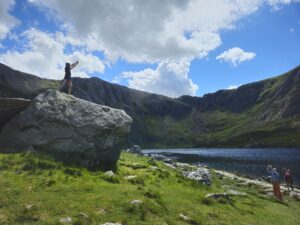 Over the course of this two-week trip, we have been writing to prompts that all in some way connect to the theme of “sense of place.” On the first day’s lecture (the only lecture-style session of the whole trip), the professor wrote on the board the following equation: “Self + Location = Place.” The location is the geographical spot on Earth where you are — for us, Wales — and the self is who you perceive yourself to be in that moment. The meaning of place is informed by your personal perceptions and experiences of both that place and yourself as you exist in it and connect to it. It’s kind of abstract, but it comes out in writing when we visit these places, through poems and short stories. I’ve been guiding my writing with this question asked by travel writer Robert MacFarlane: “What do I know about myself when I am in this place that I cannot know anywhere else?”
Over the course of this two-week trip, we have been writing to prompts that all in some way connect to the theme of “sense of place.” On the first day’s lecture (the only lecture-style session of the whole trip), the professor wrote on the board the following equation: “Self + Location = Place.” The location is the geographical spot on Earth where you are — for us, Wales — and the self is who you perceive yourself to be in that moment. The meaning of place is informed by your personal perceptions and experiences of both that place and yourself as you exist in it and connect to it. It’s kind of abstract, but it comes out in writing when we visit these places, through poems and short stories. I’ve been guiding my writing with this question asked by travel writer Robert MacFarlane: “What do I know about myself when I am in this place that I cannot know anywhere else?”
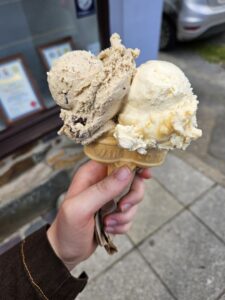 After doing some writing at the lake at Cwm Idwal, we went back down the mountain to a famous ice cream shop where I got what I called the Double ‘Fee: a twin cone with coffee mocha and banoffee (banana toffee). Visiting the shops, I bought a 1000-piece puzzle (which I’ve already built the border!) and a painting of a beach cottage by a local artist. I bought the painting to preserve the sense of place I feel in Wales before we leave: the cold white water on the rocky shore, the old weathered houses, and the flowing grasses under the open sky. It’s a lonely place, but simultaneously I have felt closer with everyone I’ve met and dined with here than in any other country. It’s been a wonderful experience so far, but we have a couple more places to visit before it’s over!
After doing some writing at the lake at Cwm Idwal, we went back down the mountain to a famous ice cream shop where I got what I called the Double ‘Fee: a twin cone with coffee mocha and banoffee (banana toffee). Visiting the shops, I bought a 1000-piece puzzle (which I’ve already built the border!) and a painting of a beach cottage by a local artist. I bought the painting to preserve the sense of place I feel in Wales before we leave: the cold white water on the rocky shore, the old weathered houses, and the flowing grasses under the open sky. It’s a lonely place, but simultaneously I have felt closer with everyone I’ve met and dined with here than in any other country. It’s been a wonderful experience so far, but we have a couple more places to visit before it’s over!
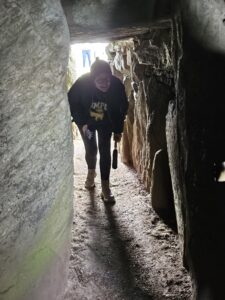 Our next stop is an ancient Neolithic tomb. Our guide, Rhys, described the mound as “an old friend,” that despite shrinking in size over time, it represents something constant and comforting about human nature. The oldest remains at the site were an arc of stones placed in the ground some 4000 years ago to mark a grave; and then, 1000 years later, another group of humans had the same thought and arranged huge circles of stones that lined up perfectly with the older ones, and build a giant mound of dirt on top. How was this tradition maintained over 1,000 years? How did these people remember the significance of this place, and what did it mean for them? What does it mean for us, living in the far-off future, trying to recapture their unknown intentions? In the tomb, a narrow rock shelf is overflowing with offerings and mementos from visitors: foreign coins, colorful pebbles, and even a wooden ice cream spoon. It seemed there, in that special place, that the desire to preserve our memories is something so innately human that Welsh people a millennium apart had it in common, and now 3,000 years later people from across the world are having the same feeling. I think that’s pretty amazing, don’t you?
Our next stop is an ancient Neolithic tomb. Our guide, Rhys, described the mound as “an old friend,” that despite shrinking in size over time, it represents something constant and comforting about human nature. The oldest remains at the site were an arc of stones placed in the ground some 4000 years ago to mark a grave; and then, 1000 years later, another group of humans had the same thought and arranged huge circles of stones that lined up perfectly with the older ones, and build a giant mound of dirt on top. How was this tradition maintained over 1,000 years? How did these people remember the significance of this place, and what did it mean for them? What does it mean for us, living in the far-off future, trying to recapture their unknown intentions? In the tomb, a narrow rock shelf is overflowing with offerings and mementos from visitors: foreign coins, colorful pebbles, and even a wooden ice cream spoon. It seemed there, in that special place, that the desire to preserve our memories is something so innately human that Welsh people a millennium apart had it in common, and now 3,000 years later people from across the world are having the same feeling. I think that’s pretty amazing, don’t you?
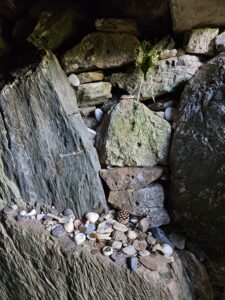 But the most poignant sense of place I have felt on this trip has been at an old farmhouse owned by a man named Mike Parker and his partner. The place is called the Red Hill because many years ago a bloody battle was fought there, but looking at it now that seems almost impossible. Mike is living in a storybook farmhouse, with small rooms and hallways decorated with landscape paintings and wooden shelves overflowing with knick-knacks and jars of local spices and seeds. Walking through the twisting paths of the garden, you’ll find the border collie Floss trotting at your heels. When she leaves you to chase the sheep wandering on the wide green slopes, you may look around you and find a little table in a clearing with two chairs and tea and Welsh cakes set out, shaded by a slouching willow tree. Here in this place, I understood what Rhys meant at the tomb when he called the mound an old friend. Though this cottage, like the tomb, was built long before I was even born, it is telling me something about myself that I cannot know anywhere else, something that can only be captured in writing.
But the most poignant sense of place I have felt on this trip has been at an old farmhouse owned by a man named Mike Parker and his partner. The place is called the Red Hill because many years ago a bloody battle was fought there, but looking at it now that seems almost impossible. Mike is living in a storybook farmhouse, with small rooms and hallways decorated with landscape paintings and wooden shelves overflowing with knick-knacks and jars of local spices and seeds. Walking through the twisting paths of the garden, you’ll find the border collie Floss trotting at your heels. When she leaves you to chase the sheep wandering on the wide green slopes, you may look around you and find a little table in a clearing with two chairs and tea and Welsh cakes set out, shaded by a slouching willow tree. Here in this place, I understood what Rhys meant at the tomb when he called the mound an old friend. Though this cottage, like the tomb, was built long before I was even born, it is telling me something about myself that I cannot know anywhere else, something that can only be captured in writing.